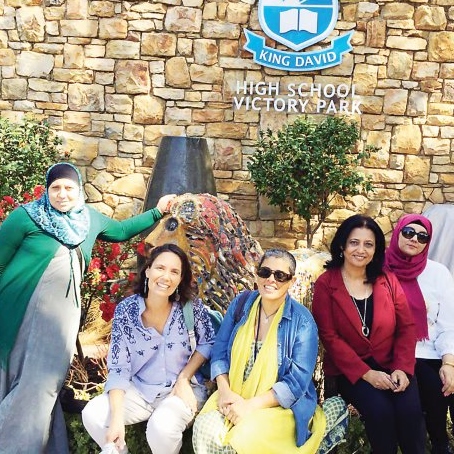click to dowload our latest edition
CLICK HERE TO SUBSCRIBE TO OUR NEWSLETTER


Published
5 years agoon
By
adminGILLIAN KLAWANSKY
This week, two Jewish and two Arab women from the Jewish and Arab Women’s Dialogue Project were in Johannesburg to share their inspiring story of bridge building.
“Until peace comes, we’re taking small steps,” says Naomi, a Jewish conflict mediator who co-ordinated the project. “All of us in the group are completely against violence.”
Of Israel’s eight million citizens, 20% are Arabs. Throughout Israel, Jews and Arabs live side by side, driving on the same roads, going to the same workplaces, and shopping at the same supermarkets. Yet, says Amar-Arran, they don’t mix with each other – at least, not enough.
The dialogue project was created four years ago.
“We had to do something to get to know each other because if we depend on regular life, it won’t happen,” says Naomi.
“We live in our own communities – Hebrew speaking towns and Arabic speaking towns. Our children study in Israeli public schools but either Hebrew or Arabic-medium [schools]. Some of us go to shul, some of us go to mosque, and some of us only rarely go to a house of prayer.
“Our delegation represents a group of 30 women who participate in our project. All over Israel there are thousands of women that participate in such co-existence projects.”
Naomi lives in Beit Shemesh in Mateh Yehuda with her husband and four children. “I care about this programme because it connects us to our neighbours and creates new beginnings,” she says. “Beit Shemesh has become a symbol of division in Israel between the ultra-orthodox and everyone else. This is a much more difficult challenge than the divide between Israeli Arabs and Jews because it’s within our religion. I hope that I will be able to help build bridges within my own town as well.”
Naomi says the dialogue project reflects democratic values. “There’s equality in the room. We respect one another. We’re committed to the process, and to recruiting friends and neighbours. When meeting as 20 or 30 women, we represent the voices of our communities.”
Naomi says these women aren’t waiting for a political solution to an indescribably complicated conflict, they’re simply making person-to-person connections.
The women initially connected through music – a universal language – says Rakefet, a Jewish Israeli participant who describes herself as an activist. “Every week, each of us brought songs, we taught each other the words, we used instruments, we danced, we laughed, we sang, and we became good friends. I’m grateful for that. I wish it [the group of women involved] would get bigger. We’ll make sure it will. I think the fact that we came here, and you can see us sitting together, travelling together, and sharing this story, is a little seed of hope that it’s possible.
“It’s women’s turn to run the world, and our way of doing it is to take small steps,” she says. “It was an opportunity to take the next step, and approach the next village, only ten minutes away. It was an opportunity to build a bridge, and to meet some new women. I was absolutely sure that I would find some magic in it, and I did.”
Ismat is an Arab Israeli who lives in the small Ein Naqquba village in Mateh Yehuda and works with special-needs children. She says her husband heard about the project, and encouraged her to join. “I participate in the group because I must, we must have connections,” she says. “We’re surrounded by Jewish villages. We sometimes need a doctor there, and our children meet in afternoon programmes during the week.
“In the beginning, I was afraid to join the group. I didn’t know how the connection with the Jewish women in the group would happen,” says Ismat. “But the group was a simple thing – a chance to meet, talk, laugh, cry, and share things as human beings.”
Another Arab woman, Salwa, also lives in Ein Naqquba and is regarded as one of the leaders of the village. She runs her own restaurant called Salwa’s House.
“At first, I was afraid when Naomi asked me to join the group. But I gathered all my friends in the community centre in Ein Naqquba where we had our first meeting, and we raised questions.” Salwa is now a passionate advocate for the group. Asked about identifying as an Israeli Arab as opposed to a Palestinian, Salwa said she was born in Israel, and so is Israeli. But in her heart and her blood, she is Palestinian. “I joined this group to promote peace,” she says. “As long as we live together, we want to live in peace.”
Tami, a Jewish woman from a kibbutz in the area, said she joined the project to network and bridge the divide. “I’m a therapist, and I have my own business. I also wanted to meet other women, Arabs and Jews, and see what problems they face at work, at home, and as mothers,” Tami says.
“We share our problems. Through talking, we see that external identity isn’t so important. We all have problems, and we get answers from talking to others. This is the gift that we got from this project. The first meeting was my first time in an Arab village, and I was scared initially, but we saw that women have a lot of power when they start to talk.”
You can’t forget politics, says Tami, but you can create your own environment of equality. “To heal the pain, you must create your own reality in a small room. That’s where you begin. Then, slowly, you go out. You can’t say it changes the reality outside, but it changes feelings about our area. Start with your own life,” says Tami.
“I hope people will start their own small circles because that’s where we can influence from the heart. The heart is where we change minds.”
